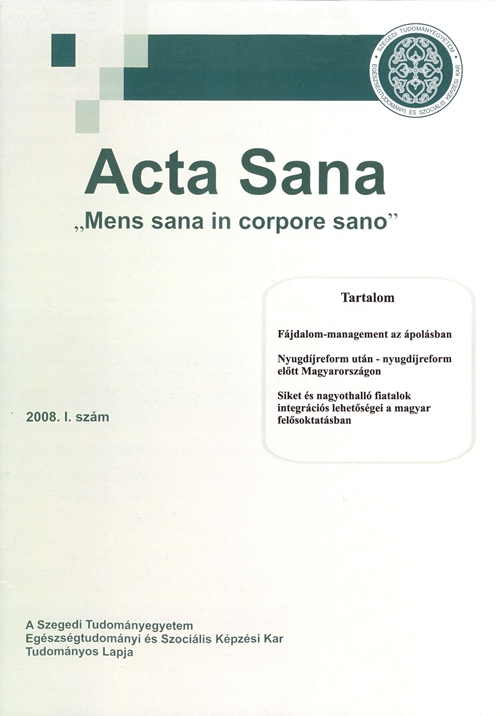Siket és nagyothalló fiatalok integrációs lehetőségei a magyar felsőoktatásban
##plugins.themes.bootstrap3.article.main##
Absztrakt
It can be observed both in the founding countries of the European Union and the ones
that joined later that the proportion of the sensory disabled and especially that of the
deaf and hard of hearing people studying in higher education is very low. In a joint
project with the participation of local organizattions of three countries (Italy, Poland
and Hungary), our research team aims at exploring the backgroung of this situation and
we try to find the possibilities of more social integration. The direct goal of the project
is that more sensory disabled people especially the deaf are admitted to institutions of
higher education.
In this study we wish to explore the real reasons of not choosing to go to higher education
and to identify the needs that are not met. It can be presumed that in the Hungarian
setting the reasons are to be found in forced oral communication in the past decades, in
poor lobbying for the interest of the deaf, and finally in the lack of social acceptance,
which is closely connected to the other reasons and it derives from them.
The research method was a snapshot questionnnaire, which could only identify the
problem because of the less than expected number of samples and which represented
only those who are already admitted to higher education.
Also, the study covers the way of communication of the affected group, the difficulties
they experience in every day life, the services they may receive, their real needs,
the role of the coordinator for equal opportunities and the (deaf and hard of hearing)
students’ vision of the future.
that joined later that the proportion of the sensory disabled and especially that of the
deaf and hard of hearing people studying in higher education is very low. In a joint
project with the participation of local organizattions of three countries (Italy, Poland
and Hungary), our research team aims at exploring the backgroung of this situation and
we try to find the possibilities of more social integration. The direct goal of the project
is that more sensory disabled people especially the deaf are admitted to institutions of
higher education.
In this study we wish to explore the real reasons of not choosing to go to higher education
and to identify the needs that are not met. It can be presumed that in the Hungarian
setting the reasons are to be found in forced oral communication in the past decades, in
poor lobbying for the interest of the deaf, and finally in the lack of social acceptance,
which is closely connected to the other reasons and it derives from them.
The research method was a snapshot questionnnaire, which could only identify the
problem because of the less than expected number of samples and which represented
only those who are already admitted to higher education.
Also, the study covers the way of communication of the affected group, the difficulties
they experience in every day life, the services they may receive, their real needs,
the role of the coordinator for equal opportunities and the (deaf and hard of hearing)
students’ vision of the future.
##plugins.themes.bootstrap3.article.details##
Hogyan kell idézni
Tunyogi, József. 2008. „Siket és Nagyothalló Fiatalok integrációs lehetőségei a Magyar felsőoktatásban”. Acta Sana 3 (1):18-24. https://iskolakultura.hu/index.php/actasana/article/view/18392.
Folyóirat szám
Rovat
Cikkek

